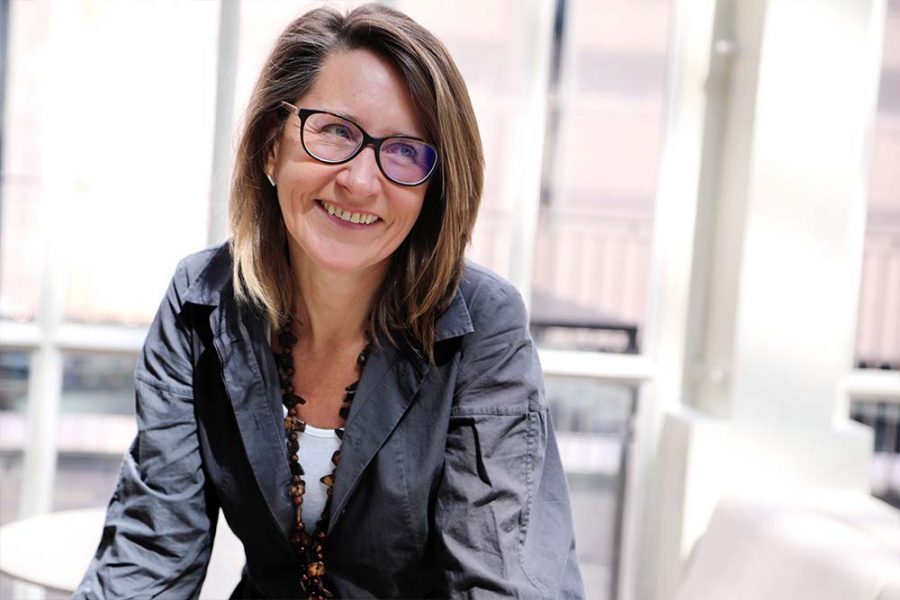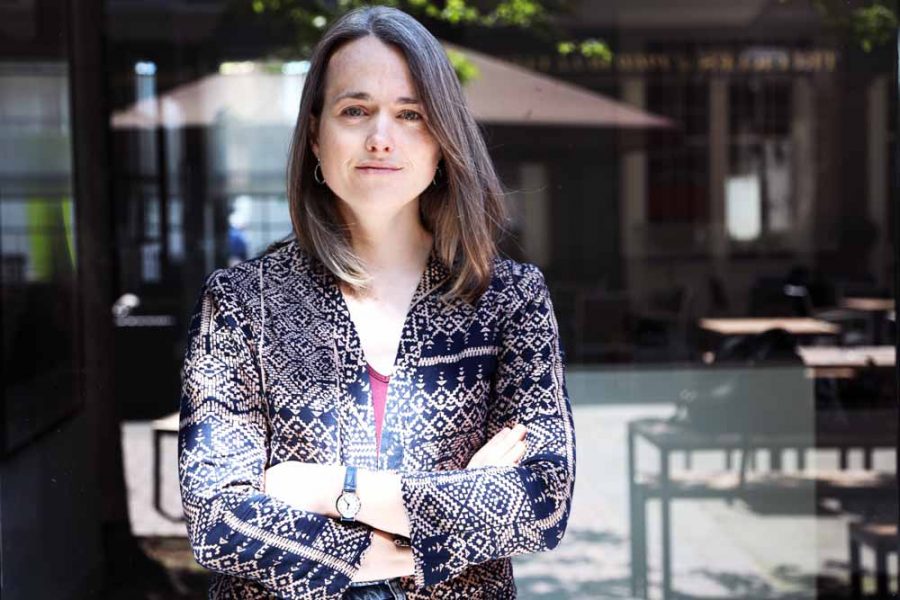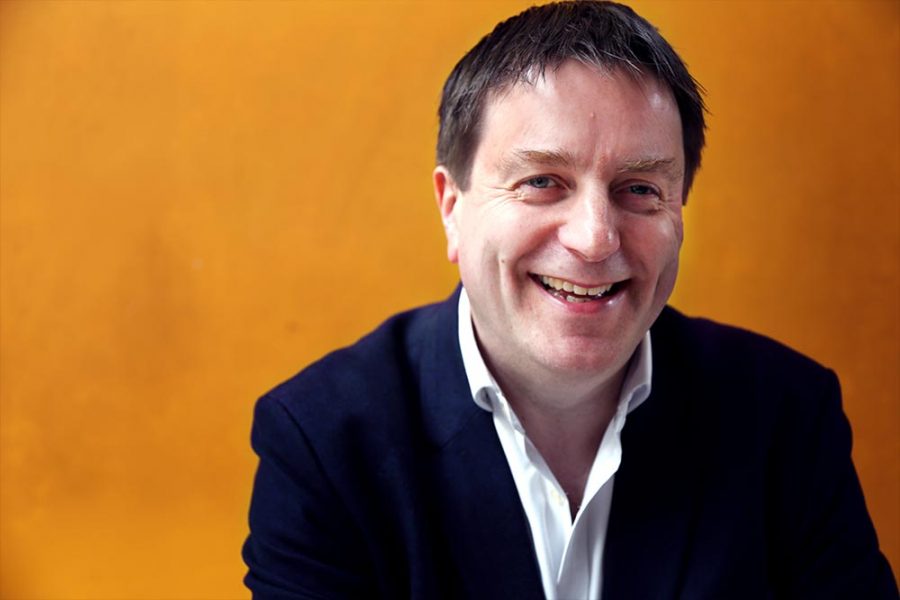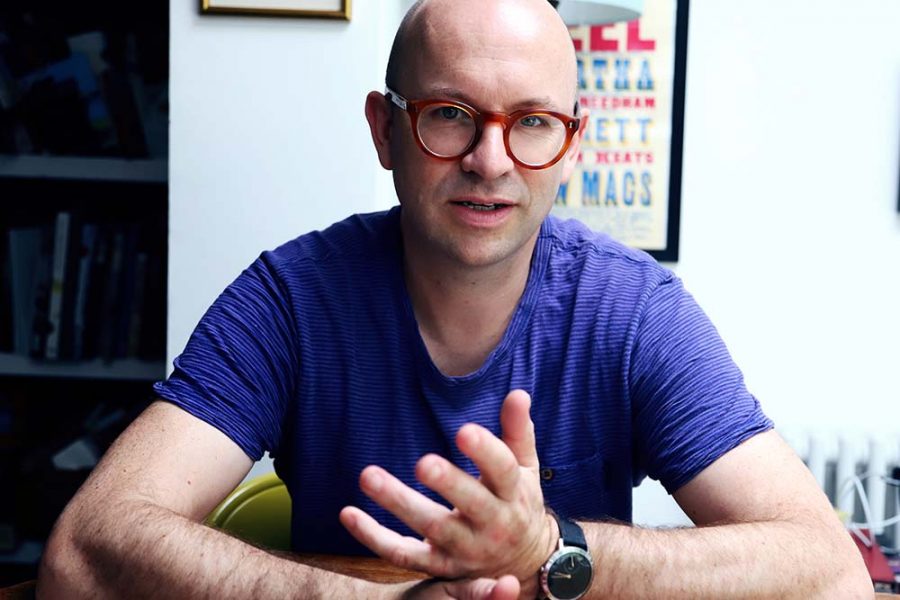In Conversation with Judith Woodworth

June 2016
Words by
Emer Nestor
Photos by
Frances Marshall
Over the past thirty years Judith Woodworth has played a fundamental role in the development and cultivation of classical music and the arts in Ireland. Her groundbreaking work as former CEO of The National Concert Hall firmly positioned the venue as Ireland’s premier performance centre and established its reputation as one of Europe’s leading concert halls.
With an impressively diverse portfolio of skills and knowledge, Woodworth has extensive expertise in corporate governance, strategic and financial issues, organizational change, the arts, artist management, print media, marketing, strategic planning, heritage and tourism. Ever in demand within the arts and entertainment industry, she has held an array of senior positions over the course of her transformative career. Woodworth is a founder member of the International Women’s Forum in Ireland and was also a member of the Irish music industry charity, the IRMA Trust. Aside from her membership on both the Arts Council of Ireland and the Governing Authority of the University of Limerick, Woodworth is also a seasoned singer and broadcaster. In 2002 she was appointed Governor of The Irish Times Trust. This autumn the Royal Irish Academy of Music will award Woodworth an Honorary Fellowship.
Here, showing no signs of slowing down, Woodworth talks to us candidly about her early career in London, the NCH, Arts in Ireland, and her current involvement with the St Patrick’s Festival, the Alfred Beit Foundation, and Alexandra College.
...at the tender age of 24 I found myself managing the careers of dozens of singers and conductors throughout the British Isles!"

Having cut your administrative teeth in London, how invaluable were those early days in cultivating your knowledge of the performing arts?
I started in the artist management business in London with a very long established company called Ibbs & Tillett. I was working there for about 6 months for one of the directors when unfortunately she suddenly died. The other directors decided I probably knew more about what was going on in her department than anyone else, so at the tender age of 24 I found myself managing the careers of dozens of singers and conductors throughout the British Isles!
I then moved on to Harrison Parrott, which was a younger and more dynamic firm, and from there I was able to build up contacts with leading musicians and promoters worldwide. This network was of course of huge benefit to me later on in my career and in the early 1980s I was invited to become artistic director of the Music Festival in Great Irish Houses. This summer music festival (now in its 46th year) was based in some of the loveliest historic houses and castles throughout the country and I persuaded such artists as Ashkenazy, Janet Baker, Kyung What Chung, Kyrstian Zimmerman, Frederica von Stade, and many more to perform in these intimate and unusual venues.
Why did you decide to move back to Ireland?
Having returned regularly to Ireland to manage the Festival, I really caught the promoting bug! Also I realised that the opening of the National Concert Hall in 1983 transformed the potential for developing concert promoting in Ireland. Although I really loved my work in artist management, I felt after 12 years working in London that I faced the option of either staying there for the rest of my life or taking the plunge to work freelance in Ireland.
Did you encounter much opposition when you first proposed the idea of a Celebrity Concert Series at the NCH?
I had identified that there was an opportunity to establish a subscription series and had already sounded out a large number of colleagues in the artist management business as to whether they would support me by offering me dates for their top artists to appear in Dublin. The Board and management of the NCH were generally very encouraging when I approached them and I was able to confirm dates for my first Celebrity Concert Series in the 1988/’89 season—all pianists.
What are your memories of the first Series?
What initially astonished and heartened me was the very positive response of music lovers to the series and all 5 recitals sold extremely well. The very first artist I presented was Barry Douglas who was fresh from his triumph winning the Tchaikovsky Piano Competition. The final recital in the series was to be given by Alfred Brendel. However, Brendel cancelled at the last moment—a situation every promoter dreads! I was determined to find a replacement artist, because not only was the concert sold out, but I had an important sponsor lined up. A brilliant Russian pianist was recommended to me, however visa regulations were still very tricky in the former Soviet Union and I had the greatest difficulty in organising his travel and passport. I received great help from a friend here in the Department of Foreign Affairs and the pianist arrived just in time to save the day. Needless to say that was not to be the last time that I experienced difficulties with cancellations—there have been many other challenges over the years, not to mention an international orchestra whose musicians arrived, but rather carelessly left their instruments behind in the UK!
Over the 5 years I ran the Series as a freelance promoter, many leading international performers took part, including Anne-Sophie Mutter, Radu Lupu, Andras Schiff and eventually Alfred Brendel. And of course, in my time as Director of the NCH, many more international artists such as Maxim Vengerov, Evegny Kissin, and Cecilia Bartoli made their first concert appearances in Ireland.


You donned the hat of ‘project manager’ for the NCH’s massive redevelopment from 2006–2010 — why was this venture so important to you?
In 2006 the Government made the decision to purchase the whole of the Earlsfort Terrace site from UCD and so the Board of the NCH, together with the OPW, then embarked on plans to develop the complex as a performance centre, which would also embrace the splendid Iveagh Gardens at the rear of the buildings. Undoubtedly, if the plans had gone ahead, it would have provided Ireland with a magnificent new concert hall (in addition to the current hall) with splendid facilities for the resident RTÉ National Symphony Orchestra, rehearsal and education spaces, a small chamber music hall, and of course enhanced facilities for audiences. This would have led to the regeneration of the NCH and placed the NCH among the world’s leading concert halls. The international design teams had wonderful plans for the site, however, as we all know, the economic collapse put a stop to any development. It is good to see that government investment in the NCH has now recommenced and that renovations are taking place, albeit more modestly.
Having worked so intimately with the NCH in so many roles, including Director/CEO, how did you feel about leaving her for pastures new in 2010?
I was Director of the NCH for almost 18 years and involved in promoting concerts there for over 25 years. I thoroughly enjoyed my time there and I had achieved many of the things I had set out to do— most particularly to position the NCH as an important European venue for international touring by solo musicians and international visiting orchestras. One of the concert highlights for me was eventually succeeding in 2008 (after trying for many years) in engaging the Berlin Philharmonic with their principal conductor Simon Rattle. I was of course rather sad to leave the NCH, and I particularly miss the buzz of promoting concerts and the interaction with wonderful musicians young and old, and the very committed and hardworking staff at the Hall.
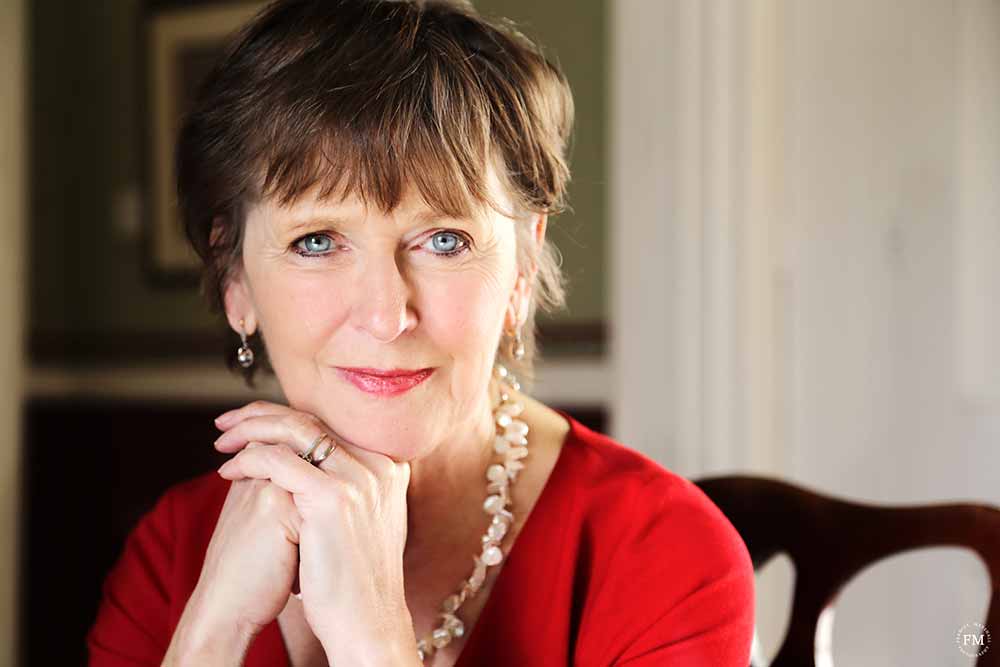

Tell us about your role as Governor of The Irish Times Trust.
I have been most fortunate over the years to be offered opportunities to become involved in really interesting and challenging activities. I became a Trustee of The Irish Times in 2002 and by the time I left in 2012, the newspaper industry had changed utterly. At the beginning of the naughties, The Irish Times expanded into other businesses and with revenues increasing, everything was geared around growth. During the following 10 years, the development of the Internet and social media, together with the collapse in advertising revenues meant that the newspaper industry internationally experienced huge challenges. It was fascinating to be so close to the centre of political commentary and controversies over that period, and also to appreciate the work of so many talented and passionate journalists.
How did you become involved with the Dublin International Piano Competition?
Very simply John O’Conor and Ann Fuller (the founders) asked me to help them when they were establishing the very first competition in 1988. I assisted them in making contacts with artist managers and the managers of various orchestras and venues, so that they could offer an extensive list of concerts for the winner of the competition. I am delighted to now sit on the Board of the Competition, even though, like most arts organisations, it is facing real challenges with funding. It is an extremely successful international piano competition and it is very important for music in Ireland that it continues to attract to Dublin the very best of young players from around the world.
Who inspires you within the current field of classical music?
It is really encouraging to see the array of successful careers being pursued by so many young Irish musicians today. A generation ago there were trail blazers like Barry Douglas, John O’Conor, and Ann Murray, and now the concert halls and opera houses around the world are populated by many outstanding younger Irish musicians—a credit to the wonderful teachers we have here in Ireland—such as Finghin Collins and Tara Erraught. Additionally, there are many Irish people working in managerial roles throughout the music business and making a great contribution to the classical music sector.
My own musical training, whether in piano or later on as a singer, has certainly been a guiding force in leading me into my chosen career."

Undoubtedly, you are an ambitious, highly motivated, and fearless individual — what drives you?
I really don’t consider those characteristics as part of my makeup! However, others may think differently…I have always been keen to achieve the highest standard possible in anything I undertake and I guess I am rather determined, as well as entrepreneurial, and always prepared to take some risks to reach my objective. My own musical training, whether in piano or later on as a singer, has certainly been a guiding force in leading me into my chosen career. I do really understand the pressures and ambitions which drive all musicians, and I think that has been really helpful in building a rapport and relationship with many artists over the years.
What constitutes lifestyle balance for you?
Managing a 24/7 business such as a concert hall can be very stressful at times, particularly when artists cancel, or bad weather prevents the arrival of musicians from overseas, coupled with the constant challenge to reach box office targets. I enjoy gardening and have found that it can distract me so completely that I really do switch off for a while. My husband and myself enjoy entertaining and getting together with our family and friends as regularly as possible. We also enjoy travelling, particularly for city breaks.
If we were to peruse your album/CD collection, what guilty pleasures would we find?
You would certainly find all Cecilia Bartoli’s recordings, either Philippe Cassard or András Schiff playing Schubert, and a really old recording of Kyung Wha Chung and Radu Lupu performing César Franck’s Sonata for violin and piano. I also listen to a lot of orchestral and chamber music—but I wouldn’t know where to start on listing them….
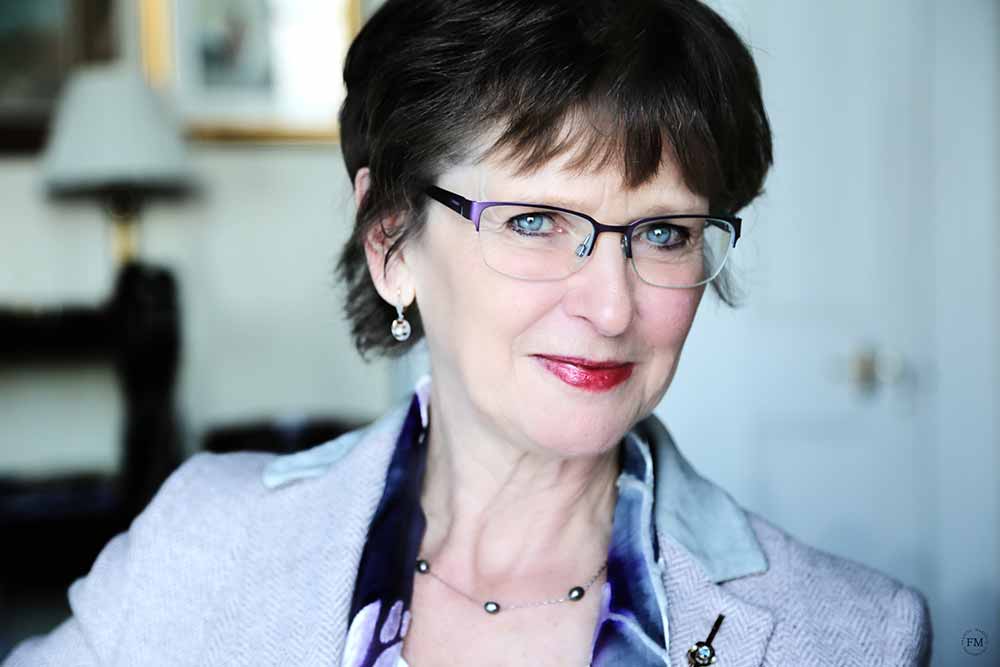
What are your thoughts on Ireland’s burgeoning opera scene and do you think a purpose-based opera house is on the cards for Dublin any time soon?
Regrettably, I do not think that Dublin will have a purpose built opera house in the foreseeable future. Hats off to Wexford Festival for building a world-class venue and long may it flourish. However, as we know, it is really extraordinary that Dublin is one of the only European capitals not to have its own opera house. Whilst the Bord Gáis Energy Theatre and the Gaiety Theatre do present quite a wide variety of opera productions, it is challenging to try to create a credible national opera company without a dedicated venue for opera and all that entails in terms of rehearsal and technical spaces.
On the positive side, the Arts Council’s opera policy over the past 5 years has enabled some very interesting and innovative relationships in the opera sector to flourish, and it is really encouraging to see the ever-increasing standards of home-produced opera performances, showcasing many outstanding Irish singers and conductors. It will be very interesting to see what emerges over the next few years. However, it will take courage and financial investment to enable anything meaningful to happen!
Now that you have reached the end of your tenure with the Arts Council, what have you taken from the experience?
What impressed me most, particularly during my time on the Arts Council, was the incredible diversity of artistic activity throughout the length and breadth of the country, and the passion and commitment of all those working in the arts, whether at professional or community level. It has been very frustrating to be on the Council during a period of such dramatic cutbacks in funding and to know that each decrease in funding would lead to job losses, as well as impact negatively on many organizations’ creative production. The Arts Council has worked hard to maintain as robust as possible an infrastructure during this very difficult period, and many good initiatives and policies have been followed through, such as strong support for the multitude of festivals throughout the country, support for touring and the establishment of Music Generation with other funding partners—to name just a few. The arts sector is very resilient—it has to be—and hopefully the Government will now begin to restore funding to the sector as rapidly as possible in recognition of just how important the arts are to the lives of everyone in Ireland.
What’s next for you?
Last year I was really delighted to be appointed chair of St Patrick’s Festival, one of the largest street festivals in the world, and of course one of the most high profile events for the Irish tourism industry—certainly one of the largest promotions I am ever likely to be involved in! I am on the Governing Authority of the University of Limerick and also serve on the board of their very fine Concert Hall. I am chair of the board of the Alfred Beit Foundation that owns and manages Russborough House and estate, and which has certainly attracted some controversy in recent times. Finally, I also chair the board of management of Alexandra College which this year is celebrating the 150th anniversary of its foundation. So I have plenty to keep me busy with all these very interesting and varied organisations…not to mention trying to establish a garden on the seafront at our house in Co. Wexford!
...it is really encouraging to see the ever-increasing standards of home-produced opera performances, showcasing many outstanding Irish singers and conductors."

All images displayed in this article are subject to copyright.
Share this article


